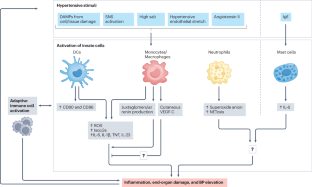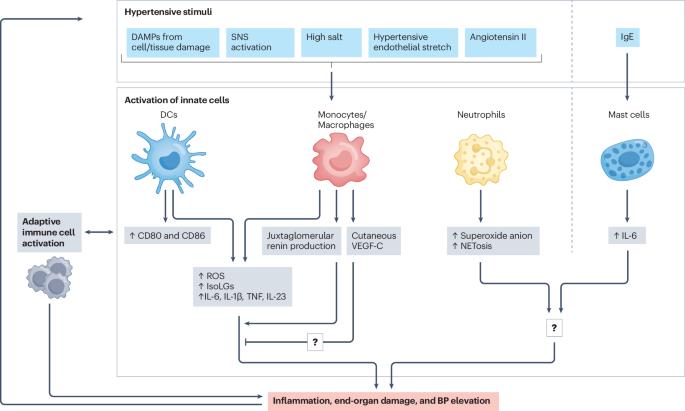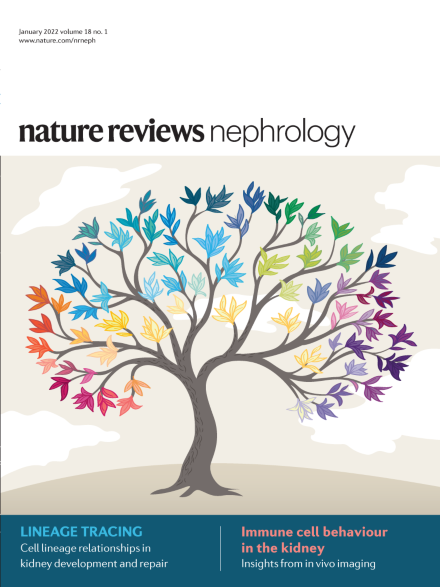高血压病理生理学中的免疫机制
IF 28.6
1区 医学
Q1 UROLOGY & NEPHROLOGY
引用次数: 0
摘要
高血压是全球发病和死亡的主要风险因素。尽管目前有抗高血压疗法,但大多数高血压患者的血压仍无法得到充分控制。此外,即使血压得到了充分控制,心血管事件和相关器官损伤的残余风险依然存在。这些发现表明,目前的治疗方法并没有解决潜在病理的一个关键因素。新的证据表明,免疫细胞是高血压发生和发展的关键介质。在这篇综述中,我们将讨论我们目前对先天性和适应性免疫细胞在高血压中的不同作用的理解,重点介绍人类和啮齿动物研究的主要发现。我们探讨了这些免疫细胞促进高血压病理生理学的机制,揭示了它们多方面的参与。此外,我们还强调了对自身免疫、艾滋病病毒和免疫检查点认识的进展,这些进展为我们深入了解高血压慢性和失调炎症的机制提供了宝贵的视角。本文章由计算机程序翻译,如有差异,请以英文原文为准。


Immune mechanisms in the pathophysiology of hypertension
Hypertension is a leading risk factor for morbidity and mortality worldwide. Despite current anti-hypertensive therapies, most individuals with hypertension fail to achieve adequate blood pressure control. Moreover, even with adequate control, a residual risk of cardiovascular events and associated organ damage remains. These findings suggest that current treatment modalities are not addressing a key element of the underlying pathology. Emerging evidence implicates immune cells as key mediators in the development and progression of hypertension. In this Review, we discuss our current understanding of the diverse roles of innate and adaptive immune cells in hypertension, highlighting key findings from human and rodent studies. We explore mechanisms by which these immune cells promote hypertensive pathophysiology, shedding light on their multifaceted involvement. In addition, we highlight advances in our understanding of autoimmunity, HIV and immune checkpoints that provide valuable insight into mechanisms of chronic and dysregulated inflammation in hypertension. This Review outlines the roles of innate and adaptive immune cells in hypertension. The authors discuss the mechanisms and important properties of immune cells that contribute to hypertension pathogenesis, such as memory and plasticity.
求助全文
通过发布文献求助,成功后即可免费获取论文全文。
去求助
来源期刊

Nature Reviews Nephrology
医学-泌尿学与肾脏学
CiteScore
39.00
自引率
1.20%
发文量
127
审稿时长
6-12 weeks
期刊介绍:
Nature Reviews Nephrology aims to be the premier source of reviews and commentaries for the scientific communities it serves.
It strives to publish authoritative, accessible articles.
Articles are enhanced with clearly understandable figures, tables, and other display items.
Nature Reviews Nephrology publishes Research Highlights, News & Views, Comments, Reviews, Perspectives, and Consensus Statements.
The content is relevant to nephrologists and basic science researchers.
The broad scope of the journal ensures that the work reaches the widest possible audience.
 求助内容:
求助内容: 应助结果提醒方式:
应助结果提醒方式:


